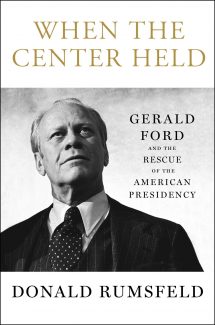Known and Unknown: A Memoir
During his tenure as secretary of defense, Donald Rumsfeld came across as a decisive, if occasionally imperious leader who might not always have been right, but was rarely in doubt.
While those traits are much in evidence in “Known and Unknown: a Memoir,’’ readers willing to look beyond the bravado will be amply rewarded. The book is an insightful look at the crucial defense and foreign policy events of the first decade of the 21st century.
Rumsfeld is mostly unapologetic about the major decisions surrounding the wars in Afghanistan and Iraq and gets defensive when responding to attacks by his critics.
Even though the Bush administration and intelligence experts were wrong about Iraq’s possession of weapons of mass destruction, or WMDs, Rumsfeld contends that the decision to go to war was still justified.
“Intelligence evidence about WMD had a way of taking pride of place in the litany of reasons for going to war. In fact, that should have been only one of many reasons. There was a long list of other charges against Saddam Hussein’s regime — its support for terrorism, its attacks on American pilots in no-fly zones, its violation of the United Nations Security Council resolution, its history of aggression and its crimes against its people,’’ he writes. “Obviously the focus on WMD to the exclusion of almost all else was a public relations error that cost the administration dearly.’’
His defense of the decision to go to war lacks the intellectual and philosophical heft one found in former British prime minister Tony Blair’s memoir, “A Journey: My Political Life.’’ Rumsfeld comes across here as someone who is smart and aware of the historical context in which events take place but doesn’t spend a lot of time over-thinking things.
Interestingly, Rumsfeld recalls the briefings he received about the Vietnam War from the Kennedy and Johnson administrations when he was a young congressman and is critical of the arrogance displayed by many senior officials. That didn’t stop him from adapting a similar stance during some of his public appearances.
The book, like all memoirs, is an attempt by Rumsfeld to shape how he will be viewed by historians. Fortunately, there isn’t a lot of “if only they had listened to me more things would have been better,’’ type of language.
He defends the troop levels used in the initial stages of both the Afghanistan and Iraq wars while eventually supporting the troop surges that occurred later in those conflicts.
“More troops do not necessarily mean a greater chance for success. In fact, too many troops could hurt our ability to win Iraqi confidence, and it could translate into more casualties, because more troops would mean more targets for our enemies,’’ he writes.
However, Rumsfeld is surprisingly critical of the Bush administration’s emphasis on promoting democracy as part of its justification for the Iraq war.
“Instead of labeling countries good or bad — democratic or nondemocratic; pro-human rights or anti-human rights — I thought a better way of categorizing countries was to consider the direction in which they were heading,’’ he writes. “It [democracy] was not the sole interest, and did not necessarily trump all others.’’
Readers will also come away with a better understanding of Rumsfeldese, as a result of the author’s translations of some of his famous phrases that received much attention and lampooning.
He explains that known unknowns are “gaps in our knowledge, but they are gaps that we know exist.’’ By contrast, unknown unknowns are “gaps in our knowledge, but gaps that we don’t know exist.’’
History buffs will enjoy the sections on Rumsfeld’s service in Congress and during the Nixon and Ford administrations. His treatment of the issues at home and abroad during that period is insightful, but the more interesting parts are his accounts of the personality clashes.
For example, he refutes the conventional wisdom that as Ford’s chief of staff he engineered the selection of George H.W. Bush to be head of the CIA to minimize Bush’s future political prospects. Rumsfeld contends he opposed Bush’s selection, and in a memo to Ford described Bush as “below the line.’’
Rumsfeld is one of the most controversial Cabinet secretaries in American history. Those wanting an insightful, if self-justifying, account of his important career will find reading “Known and Unknown: a Memoir’’ to be time well spent.
Book Review from The Boston Globe, by Claude R. Marx
- The Author

Donald Rumsfeld
Donald Rumsfeld was the 13th and 21st U.S. Secretary of Defense. He currently chairs the Rumsfeld Foundation, which supports leadership […] More about Donald Rumsfeld.
- Books by the Author
- Related Articles

5 Things You Never Knew About Donald Rumsfeld
Former Sec. of Defense Donald Rumsfeld is back with a new book "When The Center Held"! Check out our list[...]
Ratings Details
















